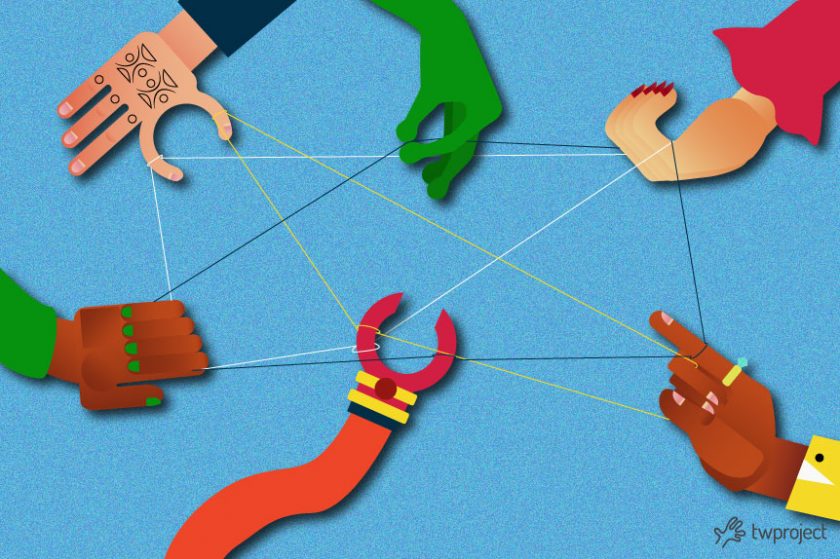Inclusivity and project management are ever-evolving domains.
Human resource management plays a significant role in project success.
Inclusivity is critical in efficiently leading a team and achieving its goals in an ever more interconnected global environment.
In this article, we cover the importance of inclusivity in project management by analyzing the core values that underlie it.
Also, we will show how Twproject can support achieving an inclusive work environment.
CONTENT
- What is inclusivity, and why is it important in project management
- The key values of inclusion in project management
- How to promote inclusivity in your team
- Inclusive leadership in project management
- Inclusivity and remote working
- Inclusivity in conflict management
- Building an inclusive corporate culture
- How Twproject supports inclusivity in project management
- Bottom Line
What is inclusivity, and why is it important in project management
Inclusivity means creating a work environment where all people, regardless of their differences, are treated fairly and with equal opportunities for growth and development.
In project management, inclusivity is crucial to enhancing the skills and experiences of each team member, thus improving collaboration and productivity.
An inclusive environment supports innovation, as different ideas and perspectives lead to original and creative solutions to problems. Furthermore, inclusivity reduces employee turnover, boosting team satisfaction and engagement.
The key values of inclusion in project management
To ensure an inclusive work environment, it is crucial to cultivate the following key values:
- Respect: treating all team members politely and respectfully, acknowledging their expertise and contribution to the project.
- Empathy: putting oneself in other’s shoes, understanding their needs and expectations, and acting accordingly.
- Open communication: encouraging sharing of ideas and opinions by listening carefully and providing constructive feedback.
- Equality: ensuring equal opportunities for growth and development for all team members, avoiding discrimination and favoritism.
- Flexibility: adapting to team members’ different needs and circumstances, offering customized solutions that align with the project.
How to promote inclusivity in your team
Here are some real-life examples of how project managers can foster inclusivity in their teams:
a. Schedule regular meetings to discuss issues and challenges team members face and offer support and resources to solve them.
b. Provide training and mentoring to all team members, regardless of their role or hierarchical level.
c. Promote diversity within your team by selecting members with diverse skills, experiences, and backgrounds.
d. Implement flexible work policies, such as flexible hours or remote working, to adapt to the needs of each team member.
e. Establish a code of conduct that promotes respect and fairness and discourages discriminatory or exclusionary attitudes.
f. Actively involve all team members in project planning and decision-making, valuing their ideas and skills.
g. Periodically monitor and evaluate the work environment to find any problems related to inclusivity and act promptly to resolve them.
Inclusive leadership in project management
To promote inclusivity in project management, project managers need to embrace an inclusive leadership style.
Inclusive leadership focuses on engaging and valuing all team members by promoting diversity of ideas and perspectives.
Here are some basic principles of inclusive leadership:
- Authenticity: inclusive leaders are genuine and sincere and show openness and honesty in their interactions with their team members. This builds a trusting and transparent environment where people feel comfortable sharing their ideas and opinions.
- Active listening: inclusive leaders are great listeners who pay attention to the needs and concerns of team members. Active listening allows them to understand different perspectives better and spot any problems or challenges the team faces.
- Support: an inclusive leader provides support and back-up to their team members, offering resources and opportunities for personal and professional development. This helps foster an environment where everyone feels valued and appreciated for contributing to the project.
- Participatory decision-making: inclusive leadership involves participatory decision-making, in which all team members can contribute to the decisions relevant to the project. This allows for more informed decision-making and greater team consensus and engagement.
Inclusivity and remote working
Remote working is a rising trend that offers many benefits for both employees and companies.
However, remote working can bring challenges regarding inclusivity, as team members may feel isolated or cut off from group dynamics.
Here are some suggestions for promoting inclusivity within the context of remote working:
- Schedule regular virtual meetings: to keep the team’s sense of belonging and unity, it is important to schedule regular virtual meetings where project goals, progress, and challenges are discussed. These meetings can be formal or informal and can include team-building activities to strengthen the bonds among group members.
- Use effective communication tools: to ensure seamless and inclusive communication, it is important to use sound communication tools, such as chat, video conferencing, and document-sharing platforms. Twproject offers a wide range of features that make it easier for team members to communicate and collaborate, regardless of their location.
- Create an inclusive work environment: to promote inclusivity in remote working, it is important to create an inclusive environment where all team members feel at ease sharing ideas and opinions. It can be achieved by promoting diversity and equity, fostering open communication and mutual respect, and providing personal and professional development support and resources.
- Pay attention to people’s individual needs: it is imperative to pay attention to your team members’ unique individual needs by offering flexible and customized solutions. For example, project managers can allow flexible schedules to accommodate different time zones or the family needs of team members.

Inclusivity in conflict management
Inevitably, conflict and tension can arise in a project team. Managing conflicts inclusively is key to maintaining a cohesive and productive work environment.
Here are some tips for inclusive conflict management:
- Dealing with conflicts constructively: project managers should constructively approach conflicts, encouraging open communication and dialogue among involved parties.
- It is important to avoid picking sides or showing bias but try to understand different perspectives and find solutions that respect everyone’s needs.
- Promoting empathy and understanding: in managing conflicts, it is important to foster empathy and understanding among team members, inspiring them to put themselves in each other’s shoes and reflect on the possible causes of tensions.
- Providing support and training: project managers can offer support and training to team members to improve their conflict management and interpersonal communication skills.
- For example, workshops or coaching sessions can be organized to help team members develop skills in active listening, assertiveness, and problem-solving.
Building an inclusive corporate culture
Inclusivity in project management is more than managing individual projects and is about building an inclusive corporate culture. To promote inclusivity at the organizational level, companies can embrace the following strategies:
a. Define a clear vision and goals concerning inclusivity: companies should define a clear philosophy and goals to guide decisions and actions at all levels of the organization.
b. Involve business leaders: to create an inclusive corporate culture, it is critical to involve business leaders in promoting inclusivity and creating a fair and respectful work environment.
c. Implement inclusive policies and practices: companies can implement inclusive policies and practices, for example, promoting diversity in hiring, providing cultural awareness training, and providing mentoring and professional development programs for all employees.
d. Monitor and gauge progress: monitoring and evaluating progress on inclusiveness regularly is important, using key performance indicators and employee feedback. This allows any areas for improvement to be identified and corrective action taken as necessary.
e. Communicate successes and challenges: to maintain a commitment to inclusivity, companies must regularly communicate successes and challenges related to inclusivity, sharing best practices and lessons learned with the entire organization.
How Twproject supports inclusivity in project management
Twproject offers multiple tools and features to support an inclusive work environment.
Here are some of the features that can help project managers promote inclusivity among their teams:
- Communication and collaboration: Twproject makes communication and collaboration within teams easier through an integrated platform that features chat, discussion forums, and document sharing. This allows team members to easily share ideas and information, regardless of location or time zone.
- Resource management: this software empowers project managers with a comprehensive overview of team members’ skills and availability, helping them to allocate resources fairly and efficiently. It also supports resource planning based on individual needs, such as leave or flexible schedules.
- Training and development: Twproject integrates training and professional development features, enabling project managers to identify team training needs and provide growth opportunities for all members.
- Monitoring and analysis: his software provides tools to monitor and review team performance, finding potential concerns or areas for improvement regarding inclusivity. This enables project managers to act promptly to ensure a fair and inclusive work environment.
Bottom Line
Inclusivity in project management is key to the success of projects and the well-being of work teams.
Project managers can create a supportive, innovative, and productive work environment by fostering inclusivity and adopting an inclusive leadership style.
Twproject software provides tools and features that support an inclusive approach to project management, making communication, resource management, training and development, and performance monitoring more accessible.
Moreover, it is essential to address the specific challenges of inclusiveness in remote working, adopting strategies to maintain a sense of team ownership and cohesiveness and to answer the individual needs of team members.
Inclusive conflict management and creating an inclusive corporate culture are other crucial factors in promoting inclusiveness at all levels of the organization.
In an increasingly interconnected and globalized world, inclusiveness in project management is a competitive advantage and a source of innovation and growth for companies.
By adopting an inclusive approach, project managers and organizations can take full advantage of the skills and experiences of all team members, ensuring the success of projects and the well-being of employees.




